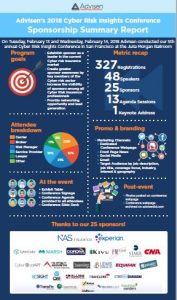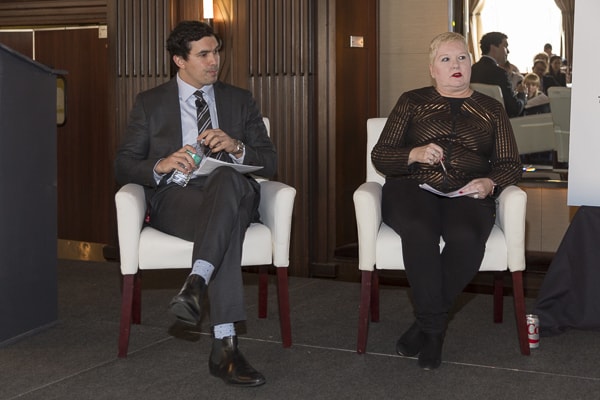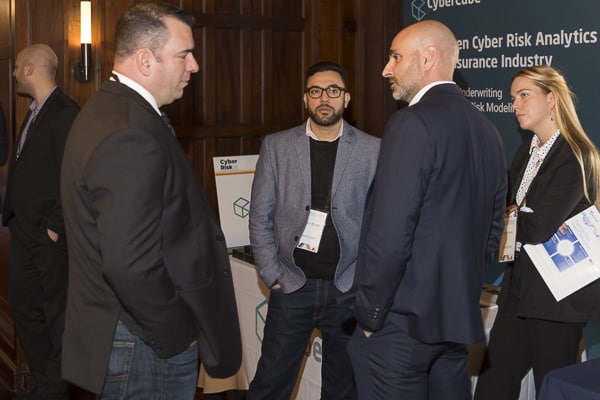Learn more about the conference!
The content, agenda & speakers for each Advisen Insights Conference is planned by an Advisory Board that represents industry thought-leaders and influential marketplace participants. Each Advisory Board is unique for each conference event.
Advisory Board meetings and conference calls are led by Advisen’s Stacie Lilien, Event Content & Programming Manager.
Advisory Board:
| • Steven H. Anderson, Vice President, Product Leader - Cyber, QBE North America • Michael Bruemmer, Vice President, Data Breach Resolution & Consumer Protection, Experian • Maeve Slattery Byrne, Director, Insurance/Captive/Risk Management, Ebay • Christiaan Durdaller, Executive Vice President, INSUREtrust • Lauri Floresca, Senior Vice President & Partner, Woodruff Sawyer • Davis Hake, Co-Founder, Arceo.ai • Brian Hetherington, Chairman, ABD Insurance and Financial Services • Garrett Koehn, Regional Director, Western US, CRC Insurance Group • W. David Little, Senior Vice President, Global Risk Management, Las Vegas Sands Corp. • Pascal Millaire, CEO, CyberCube • Shawn Ram, Head of Insurance, Coalition • Catherine Rudow, VP- Cyber Insurance, Nationwide E&S Specialty • John Soughan, Principal, Chief Underwriting Officer, Cyber Specialty, LLC |
2019 Cyber Risk Insights Conference – San Francisco
February 20, 2019 12:00 pm - 6:00 pm February 21, 2019 8:00 am - 6:00 pm The Julia Morgan Ballroom 465 California St. San Francisco, CA 941042019 Theme
Blockchain holds the potential to transform processes in many sectors of the economy. It is already having a big impact in cybersecurity. Blockchain-based applications can deter identity theft, prevent data tampering, and stop Denial of Service attacks. However, blockchain also comes with risks which insurers are only now beginning to grapple with. For example, is blockchain, which creates immutable records, at odds with GDPR, which has provisions requiring certain records to be expunged? View PDF: Why sponsor?
View PDF: Why sponsor?Please note that we take lots of pictures at our events, and we post them on our website.
At the Event, you may receive access to Advisen and third party content. Advisen is not liable for the information in the third party content. You may use them solely for your own internal, non-commercial purposes. Unauthorized distribution (via sales, copying, posting on intranet/internet) is expressly forbidden.
View Photos from Advisen's 2018 Cyber Risk Insights Conference in San Francisco








Agenda
Day 1: February 20th, 12:00pm - 6:00pm
February 20th 12:00 pm - 1:00 pm
Lunch & Registration
Lunch & Registration
February 20th 1:00 pm - 1:15 pm
Opening Remarks
Opening Remarks
February 20th 1:15 pm - 1:45 pm
Blockchain for Cyber Risk and Insurance Professionals: Why the Buzz?
Read More »
Blockchain for Cyber Risk and Insurance Professionals: Why the Buzz?
Read More »
February 7th 2:30 pm - 3:00 pm
New Distributed Ledger Technologies: Are We Already in the Post-Blockchain Era?
Read More »
New Distributed Ledger Technologies: Are We Already in the Post-Blockchain Era?
Read More »
February 20th 3:00 pm - 3:30 pm
Afternoon Break
Afternoon Break
February 20th 3:30 pm - 4:15 pm
Blockchain and Cybersecurity: Are Unhackable Systems Feasible with Blockchain?
Read More »
Blockchain and Cybersecurity: Are Unhackable Systems Feasible with Blockchain?
Read More »
February 20th 5:00 pm - 6:00 pm
Reception - Sponsored by Experian
Reception - Sponsored by Experian
Day 2: February 21st, 8:00am - 6:00pm
February 21st 8:00 am - 9:00 am
Breakfast & Registration
Breakfast & Registration
February 21st 9:00 am - 9:15 am
Opening Remarks
Opening Remarks
February 21st 10:45 am - 11:15 am
Morning Break
Morning Break
February 21st 12:45 pm - 1:45 pm
Conference Luncheon - Sponsored by Arceo.ai
Conference Luncheon - Sponsored by Arceo.ai
February 21st 3:15 pm - 3:45 pm
Afternoon Break
Afternoon Break
February 21st 3:45 pm - 4:30 pm
Outage of Cloud Services Providers – Systemic Risk for Cyber Underwriters
Read More »
Outage of Cloud Services Providers – Systemic Risk for Cyber Underwriters
Read More »
February 21st 4:30 pm - 5:00 pm
170 Insurers and Counting: The Future of the Cyber Insurance Market
Read More »
170 Insurers and Counting: The Future of the Cyber Insurance Market
Read More »
February 21st 5:00 pm - 6:00 pm
Reception Sponsored by CyberCube

Reception Sponsored by CyberCube


















